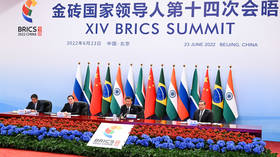Chinese ambassador outlines BRICS vision

Russia and China remain key pillars of BRICS, an international collective also comprising India, Brazil and South Africa, the Chinese ambassador to Moscow has insisted in an opinion piece for Russia’s TASS news agency, published on Saturday.
The two nations are the major “drivers” behind the development of the group, which is gradually becoming a leading force in the international arena, Zhang Hanhui, added.
The BRICS countries account for 42% of the world’s population and 25% of the global economy, Zhang said, adding that they account for roughly half of global economic growth, meaning that “the value of cooperation within BRICS is constantly rising.”
The group of emerging economies is increasingly attracting the attention of other nations, the envoy said, noting that representatives of 50 countries took part in various BRICS+ events in the first half of this year alone. He also welcomed the development of the BRICS+ format, which allows other countries to join the group’s permanent members in certain discussions. Three such events this year were attended by the leaders of 13 non-BRICS states, Zhang said.
International challenges, including the Covid-19 pandemic, the Ukraine conflict and rising tensions between major world powers, demand that Moscow and Beijing “strengthen their strategic cooperation,” the ambassador said, adding that BRICS should also “support efforts opposing hegemony and contribute to the establishment of real multilateralism” in international relations.
The ambassador pointed out that since the start of 2022, the BRICS nations have agreed on several initiatives in the field of economic digitalization and technology sharing. Beijing, which heads the group this year, has put forward a number of initiatives that would further enhance cooperation between members in the fields of innovation, he added.
The Covid-19 pandemic also demonstrated the need for closer cooperation in medical research, the ambassador said, pointing to the need for sharing healthcare products with developing nations to help them overcome the pandemic. Zhang noted that in March, the BRICS countries launched a joint vaccine development center, offering joint research and development platforms to developing nations.
The ambassador stressed that the BRICS group aims to contribute to international peace and stability as well as equality and justice in international relations. “We are sure that a more powerful and more representative as well as more active BRICS family could make a greater contribution to the international efforts aimed at defending justice, equality and solidarity as well as countering hegemony, harassment and division,” Zhang added.













